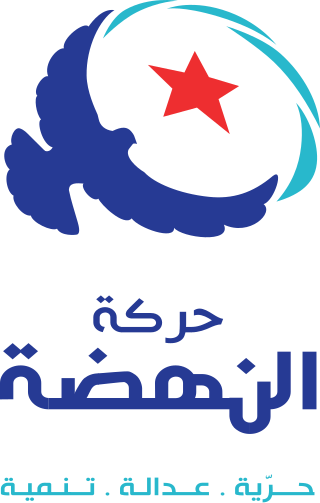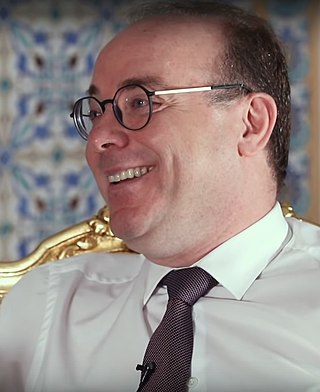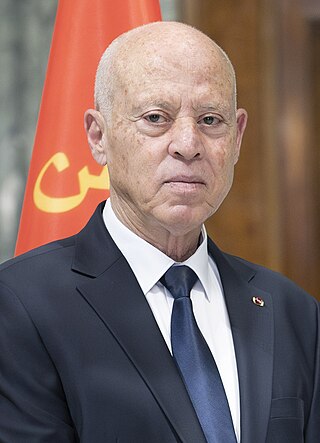
The politics of Bulgaria take place in a framework of a parliamentary representative democratic republic, whereby the prime minister is the head of government, and of a multi-party system. Executive power is exercised by the government. Legislative power is vested in both the government and the National Assembly. The Judiciary is independent of the executive and the legislature.

The politics of Tunisia takes place within the framework of a unitary semi-presidential representative democratic republic, with a president serving as head of state, prime minister as head of government, a unicameral legislature and a court system influenced by French civil law. Between 1956 and 2011, Tunisia operated as a de facto one-party state, with politics dominated by the secular Constitutional Democratic Rally (RCD) under former presidents Habib Bourguiba and then Zine el Abidine Ben Ali. However, in 2011 a national uprising led to the ousting of Ben Ali and the dismantling of the RCD, paving the way for a multi-party democracy. October 2014 saw the first democratic parliamentary elections since the 2011 revolution, resulting in a win by the secularist Nidaa Tounes party with 85 seats in the 217-member assembly.

Politics in Portugal operates as a unitary multi-party semi-presidential representative democratic republic, whereby the Prime Minister of Portugal is the head of government, and the President of Portugal is the non-executive head of state with several significant political powers they exercise often. Executive power is exercised by the Government, whose leader is the prime minister. Legislative power is primarily vested in the Assembly of the Republic, although the government is also able to legislate on certain matters. The Judiciary of Portugal is independent of the executive and the legislature. The President exerts a sort of "moderating power", not easily classified into any of the traditional three branches of government.

The president of Tunisia, officially the president of the Republic of Tunisia, is the head of state and head of government of Tunisia. Under Article 77 of the Constitution of Tunisia, the president is also the commander-in-chief of the Tunisian Armed Forces. The incumbent president is Kais Saied who has held this position since 23 October 2019 following the death of Beji Caid Essebsi on 25 July 2019. The 2022 Tunisian constitutional referendum transformed Tunisia into a presidential republic, giving the president sweeping powers while largely limiting the role of the parliament.

The prime minister of Tunisia is the head of the executive branch of the government of Tunisia. The prime minister directs the executive branch along with the president and, together with the prime minister's cabinet, is accountable to the Assembly of the Representatives of the People, to the prime minister's political party and, ultimately, to the electorate for the policies and actions of the executive and the legislature.
A prime minister–designate or premier–designate is the person who is expected to succeed an incumbent as prime minister, or premier, as the result of a general election, winning the leadership of a currently governing party, or being named by the head of state to form a new government.

The Ennahda Movement, also known as the Renaissance Party or simply known as Ennahda, is a self-defined Islamic democratic political party in Tunisia.

An election for a constituent assembly in Tunisia was announced on 3 March 2011 and held on 23 October 2011, following the Tunisian revolution. The Assembly had 217 members. It was the first free election held in Tunisia since the country's independence in 1956, as well as the first election in the Arab world held after the start of the Arab Spring.

Habib Essid is a Tunisian politician who was Head of Government of Tunisia from 6 February 2015 to 27 August 2016. He was the first Head of Government to be appointed following the adoption of the new constitution and thus considered to be the first Head of Government of the Second Tunisian Republic. He previously served as Minister of the Interior in 2011.

Noureddine Bhiri is a Tunisian politician. He served as the Minister of Justice under Prime Minister Hamadi Jebali.

Elyes Fakhfakh is a Tunisian politician. He served as the Minister of Tourism and, starting on 19 of December 2012, as the Minister of Finances as well, under Prime Minister Hamadi Jebali. He served as the Prime Minister of Tunisia from 27 February to 2 September 2020.

Parliamentary elections were held in Tunisia on 26 October 2014. Campaigning started on 4 October 2014. They were the first free regular legislative elections since independence in 1956, and the first elections held following the adoption of the new constitution in January 2014, which created a 217-seat Assembly of the Representatives of the People. According to preliminary results, Nidaa Tounes gained a plurality of votes, winning 85 seats in the 217-seat parliament, beating the Ennahda Movement and many smaller parties.

Parliamentary elections took place in Tunisia on 6 October 2019.

Kais Saied is a Tunisian politician, jurist and retired professor of law currently serving as the seventh president of Tunisia since October 2019. He was president of the Tunisian Association of Constitutional Law from 1995 to 2019.

Hichem Mechichi is a Tunisian politician who served as the Prime Minister of Tunisia, from September 2020 to July 2021, when he was unconstitutionally dismissed by President Kais Saied who dissolved the parliament, the higher council of justice, the elected county councils, the anti-corruption commission, and monopolized all state powers.
Habib Jemli or Habib Jomli is a Tunisian politician.

The 2021 Tunisian self-coup took place on 25 July 2021, when Tunisian President Kais Saied dismissed the government of Hichem Mechichi, suspended the Assembly of the Representatives of the People and revoked the immunity of its members. Described as a self-coup, the move came after a period of political instability marked by a series of protests against the Ennahda-backed government and the collapse of the Tunisian healthcare system amidst the COVID-19 pandemic in the country.

Early parliamentary elections were held in Bulgaria on 2 October 2022 to elect members of the 48th National Assembly. The snap election was called after the fall of the Petkov Government, a four-party coalition, in June 2022. This was the fourth parliamentary election since 2021, an unprecedented situation in Bulgarian history, the previous elections being the April, July, and November 2021 elections.

A constitutional referendum was held in Tunisia on 25 July 2022 by the Independent High Authority for Elections. The referendum was supported by the Tunisian president, Kais Saied, one year into a political crisis that began on 25 July 2021. The referendum was preceded by an electronic consultation regarding the nature of the political system and the method of voting in legislative elections. It was boycotted by many of Tunisia's largest political parties.
































